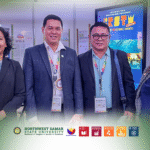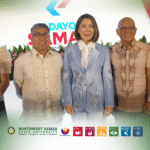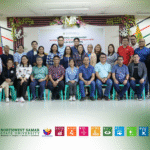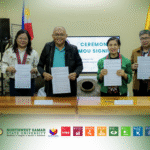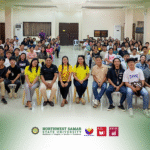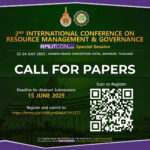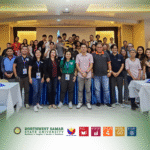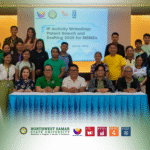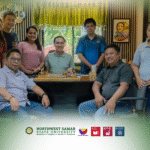Affirming its role as a driver of regional innovation and digital empowerment, Northwest Samar State University (NwSSU) actively engaged in the 34th Visayas Area Business Conference (VABC), a three-day gathering of business, government, and academic leaders held from July 23 to 25, 2025. With the theme “Visayas Rising: Accelerating Business Growth through Digital Transformation,” the event brought together stakeholders to advance digital readiness among micro, small, and medium enterprises (MSMEs). The conference was hosted by the Philippine Chamber of Commerce and Industry (PCCI) – Tacloban Leyte, Inc. at the Leyte Convention Center in Palo, Leyte. Representing NwSSU were Vice President for Academic Affairs Dr. Ramil S. Catamora, Chief Administrative Officer for Business Affairs Ms. Ivy B. Aligam, and ASBAO Director Ms. Florabel C. Canaman, who joined forums and workshops exploring policy, innovation, and inclusive growth. Insights and Innovation on Day 1 Opening ceremonies included a festive Pintados Festival performance and welcome messages from PCCI Tacloban-Leyte President Eugene A. Tan, PCCI Eastern Visayas Regional Governor Stephanie Diane “Twinkle” Chu, and Palo Mayor Hon. Remedios “Matin” Petilla. The keynote address, “Visayas Rising: Transforming Vision into Business Impact for a Future-Ready Region,” was delivered by Senator Paolo Benigno “Bam” Aquino IV (TBC), followed by a lecture from Converge ICT CEO Dennis Anthony Uy. The first plenary session, “Defining Digitalization,” gathered experts from QBO Innovation Hub, Aboitiz Equity Ventures, and Mynt (GCash), who shared insights on strengthening MSMEs through innovation. A hands-on Digital Readiness Workshop led by Flow21 co-founder Ian Denver Sanchez emphasized practical strategies for digital integration. Day 2: Reimagining Resilient Cities and Inclusive Growth Discussions on the second day focused on future-ready urban planning and inclusive digital economies. DOST Secretary Renato Solidum, Leechiu Property Consultants CEO David Leechiu, Architect Felino “Jun” Palafox Jr. and DPWH VIII Regional Director Edgar Tabacon led the 2nd plenary session “Reimagining Future-Ready Cities in the Visayas.” Digital Transformation Labs followed, with sessions including: Empowering Enterprises through Digital Business Solutions by DevTac President Walter Garcia, Building Smarter Businesses Through the Cloud by AWS Philippines’ Carlo Espejo, Harnessing AI for Competitive Advantage by Ralph Regalado of AI Kollab. In the afternoon, Plenary Session 3: Catalyzing a Future-Ready Economy through Digital Policy, Trade, and Inclusion featured PCCI Chairman George Barcelon, BDO Capital President Eduardo Francisco (TBC), and Pasig City Mayor Hon. Victor “Vico” Sotto (TBC), moderated by Melvin Esteban of WeLead Financial Advisory. Breakout industry roundtables tackled challenges and solutions in tourism, commerce, agri-tech, and food value chains. This included Hackathons, B2B Matchmaking, and Chamber Development. Beyond the conference halls, participants took part in pocket events such as VABC Golf Tournament at San Juanico Park for informal networking, Commerce Exchange, a B2B platform for buyers and suppliers, Byte Forward Hackathon, where students and businesses co-developed tech solutions in 24 hours, Visayas Chamber Development Workshop, which strengthened institutional capabilities across the region Continuing the Digital Journey The event closed with the adoption of the 34th VABC Resolutions, the turnover of hosting duties, and a preview of the 51st Philippine Business Conference and Expo (PBC&E). NwSSU’s meaningful engagement in the 34th VABC demonstrates its dedication to supporting digital transformation not only within its institution but also across communities and industries it serves. As the region advances into a digitally driven future, NwSSU remains a committed partner in building inclusive, innovation-led development.
